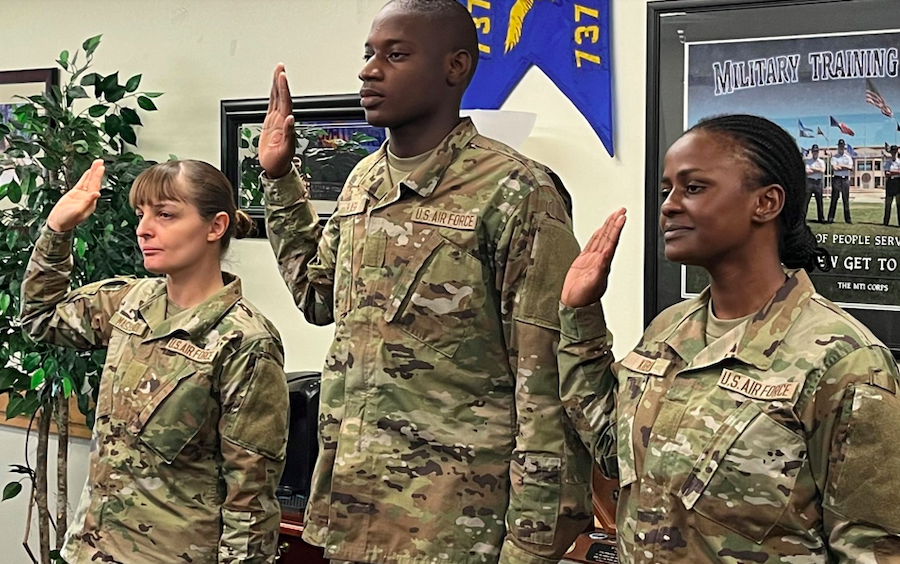They came from four continents and 10 countries, but by the end of the day on April 26, 14 men and women had two things in common: they were all Airmen, and they were all U.S. citizens.
The 14 individuals were the first to complete a new streamlined naturalization process which makes it easier for recruits to become citizens. The process is one of several efforts the Air Force is pursuing to help drive recruitment at a time where low unemployment and decreasing propensity to serve have most military services predicting a recruiting shortfall this year. The Air Force in particular anticipates it will come up 10 percent short on the Active Duty side, with a greater gap in the Guard and Reserve forces.
“What we have concluded is that there are multiple areas where we need to adapt and improve performance by single or double-digit percentage points,” Maj. Gen. Ed Thomas, commander of the Air Force Recruiting Service, said in March. “We will continue to take a hard look at ourselves and leave no reasonable option off the table.”
One of those areas is making it easier for recruits to naturalize as U.S. citizens while joining the military.
“We have people who are here, who aren’t citizens yet but are willing to serve and die for this country,” Vice Chief of Staff Gen. David W. Allvin previously told Air & Space Forces Magazine. “So the idea of being able to accelerate the naturalization process, the goal will be by the time they will complete [BMT] that they can become fully naturalized.”
A press release said the Air Force worked with U.S. Citizenship and Immigration Services to reimplement the program in March. Policy changes in 2017 meant that lawful permanent residents had to complete a background investigation before entering the service, whereas before that change, lawful permanent residents could ship to initial military training as long as their background investigation had begun and they had cleared all other screening requirements.
After the 2017 change, foreign nationals also had to complete initial military training requirements and at least 180 days of consecutive Active Duty service or one year of reserve service before they could receive a certification of honorable service for the purposes of expedited citizenship. Previously, foreign nationals could receive that certification after “one day of service,” according to a 2017 press release.
The new Naturalization at Basic Training Initiative seeks to make it easier for recruits to become citizens. Recruiters help by making sure trainees bring all the necessary documents with them to Basic Military Training. When they arrive at BMT, recruits can scan a QR code to create an online Citizenship and Immigration Services account to start their application. They can also consult a study guide in preparation for the test and virtual interview they must pass before earning citizenship.
The 14 Airmen who were formally recognized as citizens at their BMT graduation on April 26 had completed all their paperwork during the previous seven and a half weeks of BMT, but Airmen who do not complete the naturalization process at BMT can continue the process at technical school or their first assignment.
“Their desire to become citizens exemplifies their commitment and dedication to the United States,” Col. John P. O’Dell, vice commander of the 37th Training Wing, where the 14 new Airmen underwent basic training, said in a press release. “These trainees volunteered to serve a country they aren’t yet citizens of and now we get to formally recognize them upon their graduation as American Airmen.”
One of them is Airman 1st Class Natalia Laziuk, a 31-year-old from Russia who dreamt of becoming a U.S. citizen since she was 11.
“I will always be grateful for every opportunity I have here in the best country of the world,” she said.
The other countries represented included Turkey, Mexico, Côte d’Ivoire, Jamaica, Philippines, Cameroon, Kenya, El Salvador, and South Africa.
